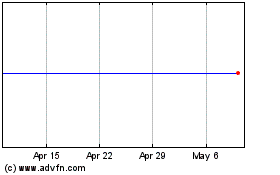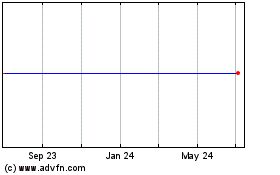UTC Chief Seeks Constant Revamp -- WSJ
June 11 2019 - 3:02AM
Dow Jones News
By Thomas Gryta
This article is being republished as part of our daily
reproduction of WSJ.com articles that also appeared in the U.S.
print edition of The Wall Street Journal (June 11, 2019).
Within a few weeks of being thrust into the CEO job, Greg Hayes
held a meeting to review United Technologies Corp.'s financial
outlook and strategy. He made a pledge to constantly evaluate the
conglomerate's businesses, which included Otis elevators and
Sikorsky helicopters.
"We're never ever done, and we're going to continue to look in a
disciplined, and let me say, dispassionate way at the entire
portfolio," he told investors and analysts in December 2014. "We
will do those things no matter how difficult."
In less than five years, the accountant turned chief executive
has been true to his word. He has revamped the sprawling company
with a series of sales and purchases that will leave him atop one
of the biggest aerospace and defense companies in the world.
He sold Sikorsky soon after taking over and in early 2016 fended
off a hostile $90 billion takeover attempt by rival Honeywell
International Inc. Instead, he set plans to spin off the Otis
division and the Carrier business, which makes heating-and-cooling
systems. All told, he will exit units that accounted for $37
billion of annual revenue, or more than half of what he
inherited.
Mr. Hayes has replaced them with a $23 billion takeover of
aerospace supplier Rockwell Collins last year and now a proposed
merger with military contractor Raytheon Co. that will create a
giant worth more than $100 billion. It will still be a
conglomerate, but it will be focused on aerospace, making
everything from Pratt & Whitney jet engines to Patriot missile
systems.
UTC and its fellow conglomerates have been under pressure from
activist investors to justify their existence, which can create
bloated bureaucracy and shield poor-performing divisions. Mr. Hayes
often describes UTC's management as being "activists," meaning they
are always looking for value in the conglomerate's businesses.
When activist investor Third Point LLC acquired a stake in UTC
last year, many of its recommendations were similar to moves that
were already under way at the company.
Under his watch, UTC shares have gained roughly 20%, compared
with a nearly 40% rise for the S&P 500. Over the same five
years, its rival Honeywell has climbed more than 80% while General
Electric Co. has plunged 60% and set plans to break itself
apart.
Mr. Hayes spent six years as chief financial officer before he
succeeded Louis Chenevert in a hasty hand off after the board
determined Mr. Chenevert was too disengaged from the company's
business.
While CFO, Mr. Hayes was involved in operations and played a
central role in managing the portfolio, overseeing several major
deals. UTC bought GE's security business for $1.8 billion in 2009
and acquired aircraft-components maker Goodrich Corp. for $16.4
billion in 2011.
After getting the top job in 2014, Mr. Hayes set off making
changes with an aggressive cost cutting program. In July 2015, UTC
agreed to sell its Sikorsky helicopter unit to Lockheed Martin
Corp. for $9 billion. In an interview Sunday, Mr. Hayes said he saw
the Sikorsky unit as constrained to a platform.
Mr. Hayes often speaks his mind and hasn't held back in his
criticism of airplane makers nudging their way into providing
aftermarket services. Engine makers like UTC's Pratt & Whitney
typically sell the huge machines with little or no profit but then
make up the money by selling decades of servicing and parts.
"If we're going to change that model," he said, "we're going to
have to think about how we price our products."
Mr. Hayes has also found himself in the middle of national
political squabbles.
An early 2016 decision to close a Carrier manufacturing plant in
Indianapolis became a lightning rod for populist criticism after a
video of a manager announcing the layoffs went viral. Then
presidential candidate Donald Trump used Carrier as a target on the
campaign trail as he promised to protect U.S. manufacturing
jobs.
After the election, President Trump called Mr. Hayes and
pressured him to change his mind. UTC reached a deal to keep some
jobs in Indiana after getting a package of incentives. Ultimately,
about 1,300 jobs left the U.S. because of the move to Mexico.
Mr. Hayes isn't above changing his mind. He graduated high
school with a plan to become an attorney, he told a magazine from
the Purdue School of Management in 2015, but switched course after
spending a year studying pre-law at Cornell University.
He transferred to Purdue University, where he majored in
economics and was a punter on the football team. He landed in a job
as a certified public accountant, a profession he pursued for eight
years. Eventually he got a finance role at aerospace parts supplier
Sundstrand. The company was acquired by United Technologies in 1999
and Mr. Hayes climbed his way into upper management, becoming chief
financial officer in 2008.
Write to Thomas Gryta at thomas.gryta@wsj.com
(END) Dow Jones Newswires
June 11, 2019 02:47 ET (06:47 GMT)
Copyright (c) 2019 Dow Jones & Company, Inc.
United Technologies (NYSE:UTX)
Historical Stock Chart
From Mar 2024 to Apr 2024

United Technologies (NYSE:UTX)
Historical Stock Chart
From Apr 2023 to Apr 2024
